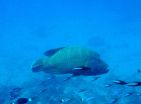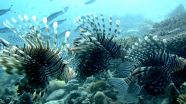Saving coral reefs depends more on protecting fish than safeguarding locations
Reefs containing more than 600 kilograms per hectare of fish biomass should be conservation priorities
2015-09-02
(Press-News.org) A new study by WCS (Wildlife Conservation Society) has found that coral reef diversity 'hotspots' in the southwestern Indian Ocean rely more on the biomass of fish than where they are located, a conclusion that has major implications for management decisions to protect coral reef ecosystems.
Using data gathered over a 12-year period from nearly 270 coral reefs across the southwestern Indian Ocean, the WCS study found that the highest conservation priorities in the region should be reef systems where fish biomass exceeds 600 kilograms per hectare. This finding conflicts with a common conservation and management policy that emphasizes the geographical location and physical factors that are often associated with reef diversity.
The study--authored by Dr. Tim McClanahan of WCS (Wildlife Conservation Society)--appears in the latest edition of the Journal of Biogeography.
Click here for a link to the study:
http://onlinelibrary.wiley.com/doi/10.1111/jbi.12604/abstract
"While geography has often been the main factor that conservation policy has used to establish protected areas, this study shows that protecting fish biomass should be the priority and this can be done with improved fisheries management," said McClanahan, a Senior Conservationist for WCS. "A hotspot is not a permanent feature and can be lost if the fish and the habitat are not protected."
Experts agree that fishing is a primary cause in the degradation of coral reefs, and needs to be better managed but what is more controversial is the various roles of protected areas or fisheries restrictions. Protecting regions containing threatened biodiversity--considered to largely be an attribute of geography-- has created a policy focus on the geographic hotspots. McClanahan found that the hotspot in the Indian Ocean is a real feature but is maintained more by fish biomass and habitat than by the geographic location. This means that fish biomass and habitat are the most influential factors and should be used to guide management decisions rather than location.
McClanahan's study of 266 sites in seven countries of the southwestern Indian Ocean measured numbers of fish species while simultaneously collecting information on the abundance of corals and algae, depth, geographical location, and the types of fisheries management. This allowed him to compare the importance of each of these factors.
The results support previous studies identifying the Mozambique Channel as a center of species richness in the southwestern Indian Ocean. However, sites in this region with low fish biomass also lacked full diversity, and being in this hotspot center alone did not ensure high diversity. Stronger correlations were found between biomass and local factors such as restrictions on fishing along with coral cover and water depth. The latitude and longitude were significant but found to contribute the least to the variation in numbers of species - a finding that challenges common conservation wisdom.
The study also reveals that protected areas that lacked regular and strong enforcement of fishing bans - classified as 'low compliance' fisheries closures - had nearly as low numbers of fish species as reefs that were regularly fished. The low compliance category included 50 of the 104 reefs included in the study. McClanahan added: "Having fishing restrictions is better than closing reefs to fishing if the closure rules are not followed, which was common and found for nearly half of the studied closures."
"The Southwest Indian Ocean is a globally important marine biodiversity hotspot. Unfortunately, this study shows that many protected areas are not doing a good job at protecting fish diversity, a shortcoming that threatens some of the world's most important coral reefs," said Dr. Caleb McClennen, Executive Director of the Marine Program. "While these ecosystems are complex, it is clear we need to do at a minimum two things very well to save the world's coral reefs: strictly enforce established marine protected areas, and; outside these areas, increase the sustainability of fishing practices to increase biomass."
INFORMATION:
The projects that lead to the compilation of the large data set were supported by the John D. and Catherine T. MacArthur Foundation, The Tiffany & Co. Foundation, and the Western Indian Ocean Marine Science Association (WIOMSA).
[Attachments] See images for this press release:


ELSE PRESS RELEASES FROM THIS DATE:
2015-09-02
Can water ever be too clean? If the intent is to store it underground, the answer, surprisingly, is yes. In a new study, Stanford scientists have shown that recycled water percolating into underground storage aquifers in Southern California picked up trace amounts of arsenic because the water was too pure.
The research, published online in the journal Environmental Science & Technology, sheds light on a poorly understood aspect of groundwater recharge with purified recycled water, namely the potential mobilization of arsenic. Arsenic is a naturally occurring element that ...
2015-09-02
ATLANTA - Sept. 2, 2015 - The number of men with breast cancer who undergo surgery to remove the unaffected breast has risen sharply, according to a new report by American Cancer Society and Dana Farber Cancer Institute researchers. The report, appearing in JAMA Surgery, is the first to identify the trend, which mirrors a trend seen in U.S. women over the past two decades.
Breast cancer in men is rare, accounting for only about 1 percent of all cases in the United States. In women (particularly younger women), the use of contralateral prophylactic mastectomy (CPM) surgery ...
2015-09-02
Genes are not only important for regular memory performance, but also for the development of Alzheimer's disease. Researchers at the University of Basel now identified a specific group of genes that plays a central role in both processes. This group of molecules controls the concentration of calcium ions inside the cell. Their results appear in the current issue of the journal JAMA Psychiatry.
Intact memory capacity is crucial for everyday life. This fact becomes apparent once a memory disorder has developed. Alzheimer's disease is the most common cause of age-associated ...
2015-09-02
WASHINGTON, DC, September 2, 2015 -- Social scientists have long argued documentary films are powerful tools for social change.
But a University of Iowa (UI) sociologist and his co-researchers are the first to use the Internet and social media to systematically show how a documentary film reshaped public perception and ultimately led to municipal bans on hydraulic fracking.
By measuring an uptick in online searches as well as social media chatter and mass media coverage, Ion Bogdan Vasi, an associate professor of sociology at the UI and corresponding author of a new ...
2015-09-02
A new study of more than 300 women suggests that exposure to certain phthalates -- substances commonly used in food packaging, personal-care and other everyday products -- could be associated with miscarriage, mostly between 5 and 13 weeks of pregnancy. The research, appearing in the ACS journal Environmental Science & Technology, is the first epidemiological study on non-work-related exposure to phthalates to provide evidence for the possible link among a general population.
Out of concern over the potential health effects of phthalates, the U.S. has banned six of these ...
2015-09-02
Scientific experiments examining what happens to the faulty channel protein that causes cystic fibrosis during inflammation have yielded unexpected and exciting results. The study, conducted by Sara Bitam and her colleagues at INSERM in France, has just passed peer review on open science publishing platform F1000Research.
Cystic fibrosis is a life-limiting auto¬somal recessive monogenic disorder that affects 1 in every 2000 - 3500 newborns in the EU and US per year. It is caused by mutations in the gene that encodes the CFTR protein, an epithelial ion channel involved ...
2015-09-02
Gum disease is a common condition among adults that occurs when bacteria form biofilms or plaques on teeth, and consequently the gums become inflamed. Some severe cases, called periodontitis, call for antibiotics. But now scientists have discovered that wild blueberry extract could help prevent dental plaque formation. Their report in ACS' Journal of Agricultural and Food Chemistry could lead to a new therapy for periodontitis and a reduced need for antibiotics.
Many people have had some degree of gum inflammation, or gingivitis, caused by dental plaque. The gums get ...
2015-09-02
NASHVILLE, Tenn. - In the popular mind, mass extinctions are associated with catastrophic events, like giant meteorite impacts and volcanic super-eruptions.
But the world's first known mass extinction, which took place about 540 million years ago, now appears to have had a more subtle cause: evolution itself.
"People have been slow to recognize that biological organisms can also drive mass extinction," said Simon Darroch, assistant professor of earth and environmental sciences at Vanderbilt University. "But our comparative study of several communities of Ediacarans, ...
2015-09-02
New research from Royal Holloway, University of London has found that changes in lifestyle over the past 30 years have led to a sharp reduction in the strenuousness of daily life, which researchers say may explain why there has been a dramatic rise in obesity.
The study, carried out by Dr Melanie Luhrmann from the Department of Economics along with Professor Rachel Griffith and Dr Rodrigo Lluberas, revealed that while obesity rates have almost trebled, surprisingly, our actual calorie intake has fallen by around 20 per cent compared to 30 years ago.
The researchers found ...
2015-09-02
Advances in 3-D printing have led to new ways to make bone and some other relatively simple body parts that can be implanted in patients. But finding an ideal bio-ink has stalled progress toward printing more complex tissues with versatile functions -- tissues that can be loaded with pharmaceuticals, for example. Now scientists, reporting in the journal ACS Biomaterials Science & Engineering, have developed a silk-based ink that could open up new possibilities toward that goal.
Most inks currently being developed for 3-D printing are made of thermoplastics, silicones, ...
LAST 30 PRESS RELEASES:
[Press-News.org] Saving coral reefs depends more on protecting fish than safeguarding locations
Reefs containing more than 600 kilograms per hectare of fish biomass should be conservation priorities

